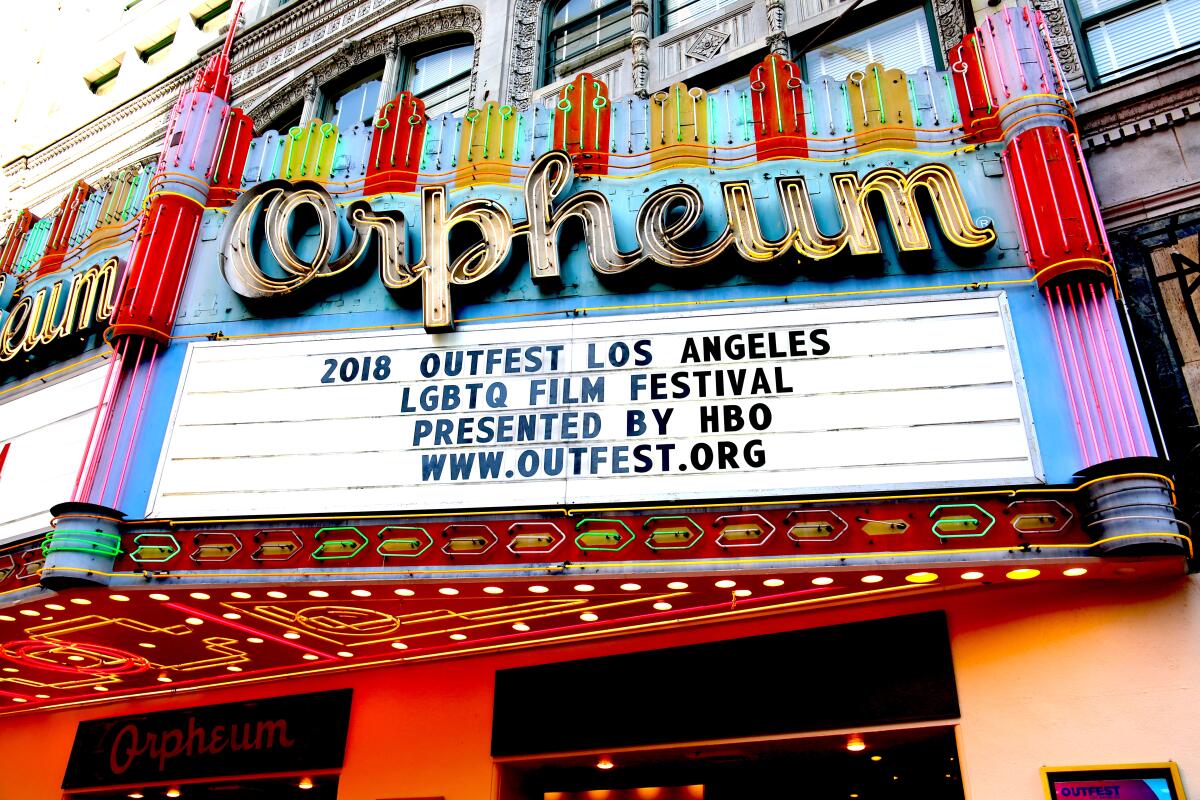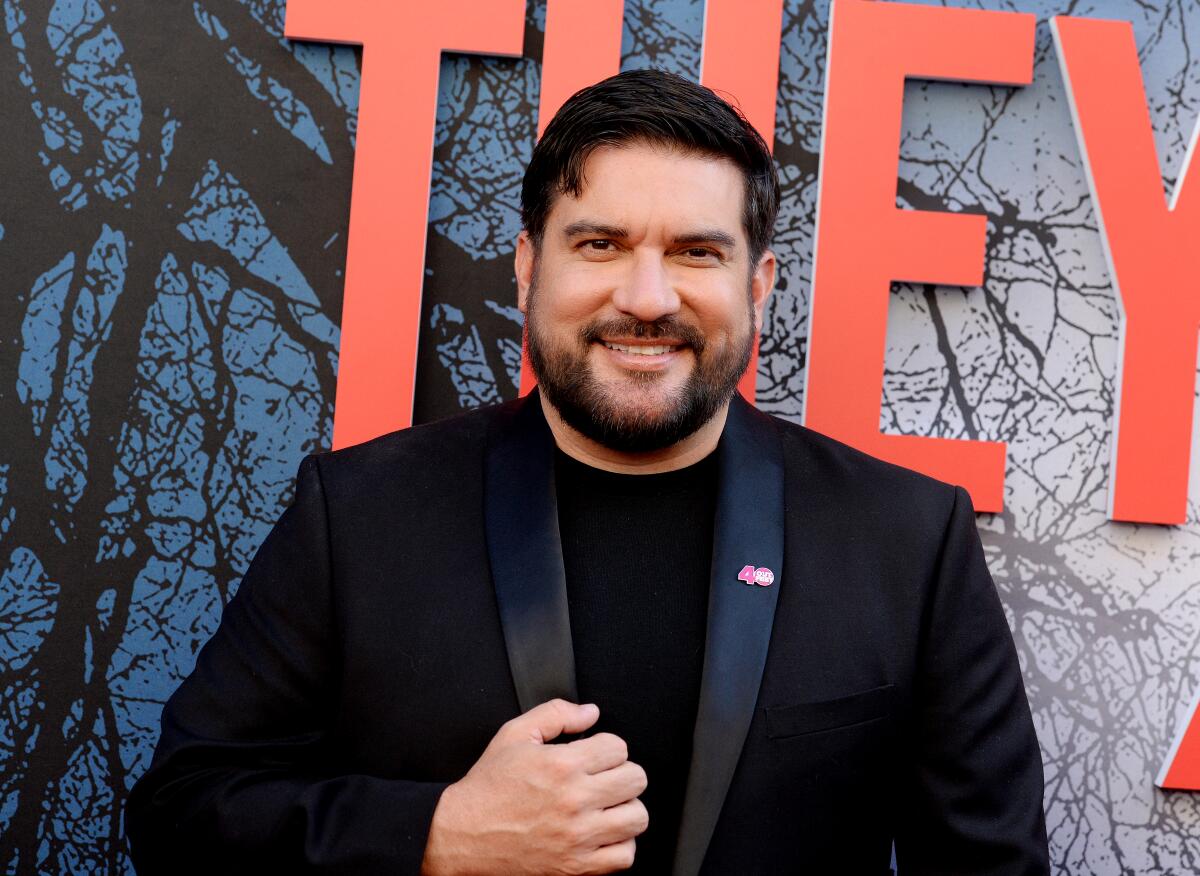It hosted one of L.A.’s oldest film festivals, then it collapsed. What happened?

- Share via
For more than 40 years, the Los Angeles-based nonprofit Outfest has been a fixture in the indie cinema circuit, elevating LGBTQ+ storytelling across Hollywood.
The operator of L.A.’s oldest film festival became a vital distribution network for movies that struggled to be seen elsewhere, and served as a launching pad for many prominent filmmakers.
Now, Outfest’s future is in doubt. The organization hasn’t paid vendors and contractors for months and recently laid off virtually all of its staff of about 20 people after many of them decided to form a union. The sole remaining employee is interim executive director Christopher Racster, who started last month.

Subscribers get exclusive access to this story
We’re offering L.A. Times subscribers special access to our best journalism. Thank you for your support.
Explore more Subscriber Exclusive content.
What happened? Outfest’s dramatic reversal of fortune began with a series of clashes between board members and the group’s former executive director over spending decisions that allegedly deepened financial woes faced by the organization, according to a Times review of internal emails, board meeting minutes and interviews with people close to the group.
In an email to donors in October, Outfest directors said the financial picture was bleak.
“Outfest is in trouble and we need your help,” the board said in its email reviewed by The Times. “Recently the Board of Directors was forced to take over day to day operations of the organization and we discovered huge amounts of undisclosed debt that had been hidden from the Board. This forced the Board to enact a series of extreme measures in an attempt to save the organization. The truth is dire: Outfest is in serious financial jeopardy and urgently needs to raise $750,000.”
Damien S. Navarro, the former Outfest executive director whose contract was not renewed in August, declined to comment, citing a confidentiality agreement that prevented him from discussing his tenure at the organization.
“They have declined to give me permission to speak to you,” he said in a statement.
But Navarro has previously alleged he was wrongfully terminated and filed an employment discrimination complaint with the state Civil Rights Department in November (he dropped the complaint in order to pursue a possible lawsuit).
In his complaint, Navarro had alleged he was discriminated against by Outfest board members, that the board failed to meaningfully investigate his concerns and that directors conspired to oust him from his position. Navarro said he was excluded from meetings and not given opportunities to defend himself.
He further stated that his last performance review was “excellent” and that Outfest had defamed him by “falsely claiming” that he “hid and obscured” from the board “undisclosed debts and critical financial information.”
Racster declined to comment on Navarro’s complaint.
“It is Outfest’s policy not to discuss matters in relation to personnel,” Racster said.
In a post-’Pose’ and ‘Transparent’ Hollywood, L.A.’s Outfest centers next steps for inclusive storytelling with annual trans and nonbinary summit
‘Outfest is in trouble’
Outfest, which began as a festival launched by UCLA grad students, had grown to attract thousands of people each year with its flagship summer film festival, which celebrated its 40th anniversary in 2022.
The nonprofit branched out into other areas over the years, launching additional events like The OutFronts, highlighting LGBTQ+ TV series; its Legacy Awards, which honored leaders and allies in the industry; and Outfest Fusion, which features voices from LGBTQ+ people of color.
Along with NewFest in New York and Frameline in San Francisco, Outfest has been a vital outlet for work by artists who have often not been recognized by other festivals and platforms. In 2005, Outfest partnered with the UCLA Film and Television Archive to create the Outfest UCLA Legacy Project for LGBTQ Moving Image Preservation, which with over 41,000 holdings is the world’s largest publicly accessible collection of LGBTQ+ films.
Filmmakers such as Gus Van Sant, Andrew Haigh, Emma Seligman and Andrew Ahn all had work showcased at Outfest early in their careers.

Like many film festival groups, Outfest was forced to adapt during the pandemic, shifting to a film festival with virtual and drive-in screenings in 2020. The unprecedented strikes by writers and actors this summer that shut down production and Hollywood’s promotional machine put further strain on the group’s finances, which depend on ticket sales, memberships, sponsorships, individual giving and grants.
“The thing is all festivals these days are in turmoil financially,” said Marcus Hu, co-president of U.S. film distributor Strand Releasing and a former Outfest board member. “It is such a sad thing that in Los Angeles of all cities, that it should have a gay festival that should collapse under financial distress.”
In a post-’Pose’ and ‘Transparent’ Hollywood, L.A.’s Outfest centers next steps for inclusive storytelling with annual trans and nonbinary summit
During the strikes and media consolidation, individuals and companies curtailed their donations to cut costs, reducing income to fund Outfest’s operations, Racster said.
“When you hit a perfect storm, you don’t really see it coming,” he said in an interview.
But the external challenges were deepened by Navarro’s alleged actions, according to the nonprofit’s internal communications and interviews with people close to Outfest’s leadership and former employees. The sources spoke on condition of anonymity because they were not authorized to discuss personnel matters or feared retaliation.
Outfest hired Navarro in 2019, in part due to his track record as a digital media entrepreneur and marketing expert.
Navarro was the founder of digital agency Earthbound Media Group and co-created consulting firm The Institute. He also was the president of Vimby, a production and marketing agency that was formerly MGM/Mark Burnett’s content studio.
While Navarro’s hiring was met with high hopes that he would elevate Outfest’s profile, the honeymoon didn’t last.
He and the board collided over the use of a $700,000 estate gift Outfest received last year.
Board members complained they were kept in the dark about how the gift money was spent, including paying down a deficit, and the extent of the organization’s financial shortfall, sources said.
By January of this year, a financial services vendor warned that the group needed to cut about $1 million from its operating budget.
Outfest had a budget of $4.1 million in 2022.
In order to keep costs down, a board committee had instructed Navarro to not host any events at the famed Sundance Film Festival and to limit the number of Outfest attendees, according to board communications reviewed by The Times.
“Despite several clear board decisions that Sundance programming would not move forward, Damien sent a Jan-Feb budget for approval that includes full programming + 6 attendees at Sundance this year,” one director wrote to other board members in a Jan. 3 email reviewed by The Times. “Not only was this not approved by finance, this was explicitly communicated as unapproved. What was approved was 4 attendees on 2 festival passes with NO brunch or programming.”
Directors also made it clear they did not think it was necessary for Navarro himself to go to the film festival, sources said.
In fact, Navarro ended up attending Sundance and conducted some personal business while he was there, although he did not seek reimbursement from Outfest for those expenses, board minutes show.
And despite the initial no-programming edict, Navarro arranged a series of breakfast panel discussions sponsored by Acura.
Ultimately, nine people, including Navarro, attended Sundance on behalf of Outfest, which went over budget on the event by $8,000 to $9,000, sources said.
Hollywood’s twin strikes translated into a lost year of production for much of the industry with productions idle since last spring. SAG-AFTRA’s strike against major media companies stretched 118 days.
Another dust-up occurred last summer when Outfest paid for actor John Waters’ star on the Hollywood Walk of Fame.
Under a deal arranged by Navarro, Outfest committed to underwrite $22,500 of Waters’ Hollywood star, while Waters would contribute $32,500 and Outfest would agree to reimburse him, according to a copy of the agreement reviewed by The Times.
But sources familiar with the matter said the deal was made without the board’s authorization and after directors specifically said they did not want Outfest funds committed to the project.
Waters declined to comment.
Outfest’s board in August decided to not renew Navarro’s contract, which expires at the end of the year. Navarro took a leave of absence from the organization in September.
Racster, the interim director, said he could not discuss the circumstances surrounding Navarro’s leave, but he said the board did a “really outstanding job of leaping in when this organization was facing a crisis in taking some hard and proactive steps to assure the livelihood of the organization.”
Labor tensions
As tensions increased between Navarro and his bosses, Outfest’s staff also grew restless.
Beginning in the spring, two former staff members said they started noticing that vendors and contract workers were not getting paid on time. At first, they were told it was due to a new payment system, but as the bills started to pile up, some began to suspect larger financial issues.
Some staffers had grown frustrated at working long hours and doing work outside the scope of their job descriptions. They sought to improve working conditions by forming a union, called Queer Filmworkers United (part of the Communications Workers of America).
Days after the union was announced, Queer Filmworkers United said five Outfest employees were laid off (four who were part of the union).
“These layoffs represent a majority of the QFU Organizing Committee,” the union said on Instagram on Sept. 28. “It is difficult to interpret their decision as anything but retaliatory.”
Then, on Oct. 27, Outfest laid off 13 more employees, a large number of whom were already on unpaid furlough.
“Sad to report that I and all Outfest staff have been let go from the organization. Amazed that it’s come to this,” wrote Mike Dougherty on X, formerly known as Twitter. “Just blown away at how soulless and corporate it’s all been. Not at all what we’re about,” he added.
Outfest denied that the layoffs were tied to the union activity.
“The organization financially had no option other than to begin layoffs and it did not have anything to do with the unionization process,” Racster said.
Nonetheless, union members blame the board’s leaders for what happened and called for its co-presidents, Nii-Quartelai Quartey and Bil Bertini, to resign.
“Bertini and Quartey are both responsible for the reckless manner in which the Board laid off the entire staff with total disregard for their well being,” the union said in a Nov. 6 Instagram post.
Quartey declined to comment. Bertini referred The Times back to Outfest, which declined to comment.
Some independent contractors who helped Outfest host big events still haven’t gotten paid.
Graphic designer Aspyn Oakes said they are still owed $2,400 for doing contract work on Outfest’s flagship film festival in July. In September, Outfest informed Oakes they would get paid but didn’t provide a timeline for when.
Several former workers, including Oakes, said more work needs to be done by Outfest leadership to regain the trust of the people who used to work there.
“Are they really committed to upholding their mission statement of treating everyone respectfully and making sure that they treat their employees at home with as much respect as they do folks that are attending their events?” Oakes asked.
In November, Outfest brought back Racster, a former executive director who served before Navarro, in an interim leadership role to help turn things around.
“We’re going to come back from this,” Racster said.
For now the organization is taking a pause to “take a look at how to move forward in a more sustainable fashion.”
He declined to discuss the group’s finances but said the board is fundraising to pay back its vendors and contractors and hopes to eventually bring back its staff, he added. The summer festival could return but in a different form, he said.
Board member B. Pagels-Minor, founder of DVRGNT Ventures and co-founder of the Wealth Salons, is optimistic about the future.
“I’m super hopeful,” Pagels-Minor said, “that people will want to trust us and believe in us again and know that we are going to do everything in our power to accelerate LGBTQ+ representation in front of and behind the camera.”
Staff writer Mark Olsen and librarian Scott Wilson contributed to this report.
More to Read
Inside the business of entertainment
The Wide Shot brings you news, analysis and insights on everything from streaming wars to production — and what it all means for the future.
You may occasionally receive promotional content from the Los Angeles Times.












